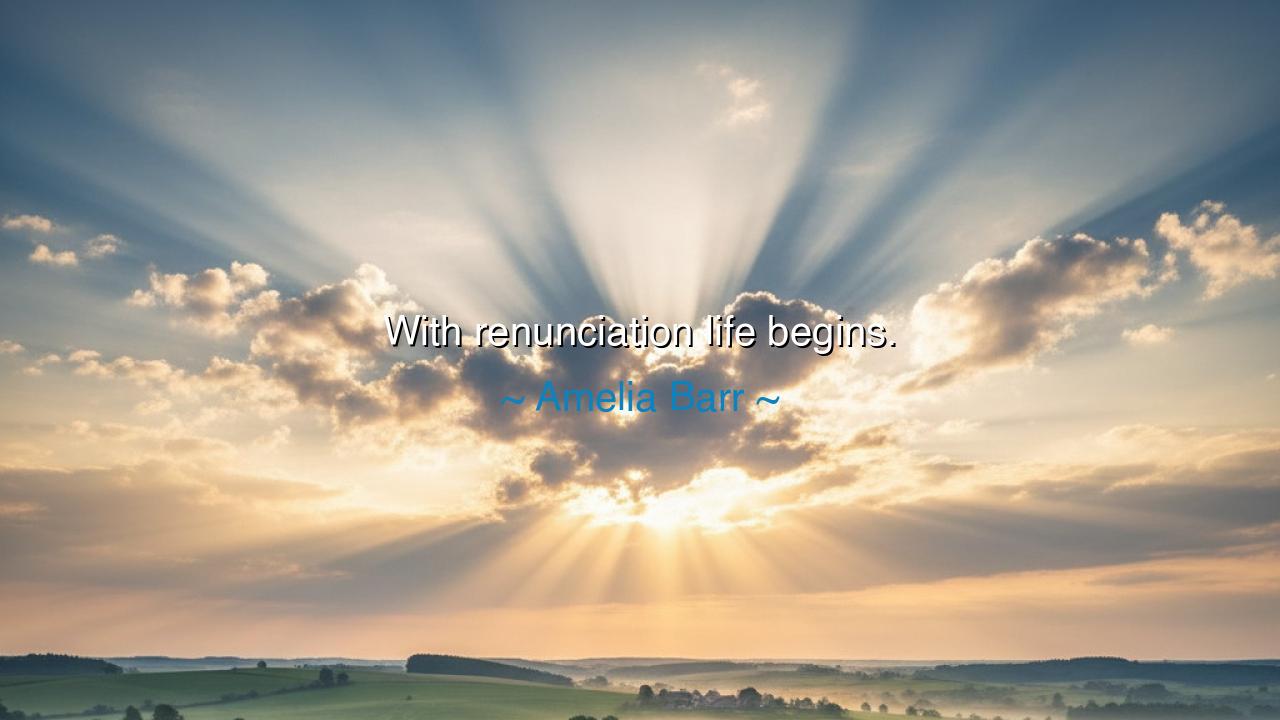
With renunciation life begins.






When Amelia Barr wrote, “With renunciation life begins,” she was speaking not of death or loss, but of awakening — the birth of the true self that rises when one loosens the chains of desire. Her words carry the weight of a universal law: that as long as the heart clings to what it cannot keep — to wealth, ambition, vanity, or control — it is not truly living, but merely surviving in illusion. It is only when we renounce, when we willingly release what we thought defined us, that we find the quiet, powerful freedom that is the beginning of real life.
Amelia h Barr, an English-born novelist who endured deep personal tragedy, spoke from experience. She lost her husband and several of her children to yellow fever after immigrating to America. Yet from this crucible of sorrow emerged not bitterness, but clarity. She came to understand that the soul’s strength is born not from possessing, but from enduring — not from abundance, but from acceptance. Her words are both a confession and a revelation: she learned that life begins where clinging ends, for the spirit that ceases to grasp finally learns to soar.
To renounce, in Barr’s wisdom, is not to reject joy or beauty, but to let go of attachment — to love without possession, to act without greed, to strive without fear. It is the inner stillness of the sage who knows that all things are transient, that to hold too tightly is to lose, and to release is to receive anew. This principle runs through the teachings of all the great traditions. The Buddha, leaving behind his palace of pleasures, discovered enlightenment not through gain, but through renunciation — through the profound understanding that freedom comes when desire no longer governs the heart. The same truth echoes in Christ’s command: “Whoever loses his life for My sake shall find it.”
Consider the story of Leo Tolstoy, the great Russian writer who, after achieving fame, wealth, and honor, found himself haunted by despair. Surrounded by comfort, he could not find meaning. It was only when he renounced his wealth, simplified his life, and sought humility among peasants that he rediscovered peace. What he gained was not less, but more — not the shallow joy of possession, but the deep contentment of purpose. In his surrender, life truly began. Tolstoy’s journey mirrors Barr’s truth: that renunciation is not the end of joy, but the doorway to it.
For modern souls, burdened by the noise of material pursuit, Barr’s wisdom rings like a bell in fog. We are told that happiness lies in accumulation — more success, more pleasure, more acclaim. Yet the more we gather, the emptier we feel. The spirit starves beneath the weight of abundance. To renounce is to remember that we are not what we own, nor what others think of us. When we loosen our grasp on the world, we find that life — pure, unadorned, luminous — was waiting all along. Simplicity, not excess, is the soil in which the soul grows.
But renunciation does not mean retreat from the world. It is not the denial of life, but its purification. To renounce is to walk through the marketplace with a heart unbound. It is to give without fear of loss, to serve without thought of reward, to love without demand. The one who renounces does not escape life — he embraces it in its truest form. The chains of ego fall away, and the soul stands free, able to see the divine in all things. For the one who possesses nothing clings to nothing, and thus, everything is his.
Let this, then, be the lesson: if you wish to live fully, learn to let go. Release the need to control outcomes, to seek approval, to hoard comfort. Practice renunciation in small things — the extra desire, the needless resentment, the fear of tomorrow. Each act of letting go is an act of rebirth. When the heart no longer wrestles with the world, life flows through it like a river unhindered by stone.
Thus spoke Amelia Barr, a woman who lost much, but gained the highest wisdom: that life begins not in the abundance of possessions, but in the abundance of peace. For the one who renounces is not poor, but rich in freedom; not empty, but filled with spirit. And when at last we learn to say, “I need nothing, for I am whole,” then — and only then — does life, in its fullest, most radiant meaning, truly begin.






AAdministratorAdministrator
Welcome, honored guests. Please leave a comment, we will respond soon